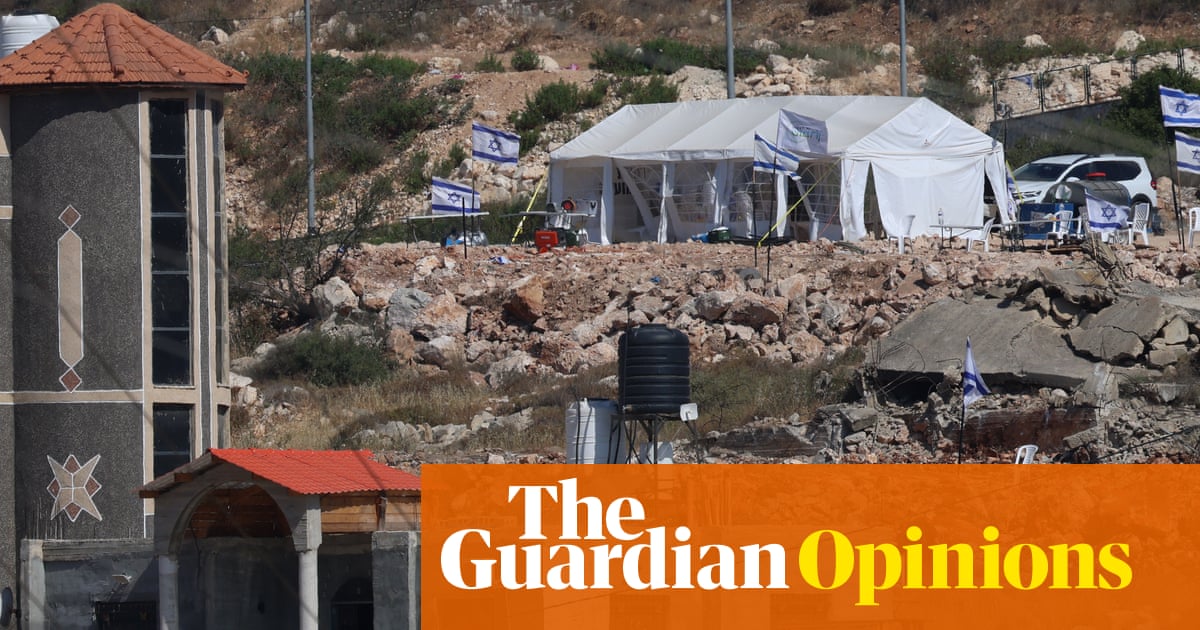Each of the22 illegal settlementsapproved by Israel last week is another nail in the coffin of the peace process, hammered in by the complicity of western governments and corporations. Israeli settlements are not benign civilian neighbourhoods – they are primary instruments of dispossession, control and apartheid. Settlements are closed militarised zones on Palestinians’ stolen land, cutting off our access to our resources, our farms, our schools, our jobs and each other. Palestinian lands rapidly shrink, our livelihoods are devastated, our rights are systematically violated and our identity is undermined.
Western lawmakers look on, expressing commitment to peace through a two-state solution but choosing to do nothing to achieve this goal. Instead, their policies and inaction enable yet further settlement activity.
In the West Bank we live in an obvious two-tier system, yet most lawmakers continue to shun the word “apartheid” despite Palestinian, Israeli and international human rights organisations concurring on its accuracy and theinternational court of justice(ICJ) reaffirming it last July.The Settlers, the BBC documentary by Louis Theroux, helped expose this reality, showing me being prevented from even walking on the same streets as Israelis in the neighbourhood of Hebron, where I was born.
In response to the documentary, Israeli settlers and soldiers broke into my yard, vandalised it and assaulted me. Soldiers made no arrests but instead threatened to arrestmeif I filed a complaint. Then one morning at 4am, young settlers made a bonfire on private Palestinian land outside my home and chanted that they hoped to see me killed. One individual showed up right in front of my house in army fatigues and with a semi-automatic rifle to intimidate me. Settlers then stole my pan-African flag, given to me by Black Lives Matter, and burned it among a pile of Palestinian flags.
It is the same story in nearby Masafer Yatta, featured not only in The Settlers but also in the Oscar-winning filmNo Other Land. Directors Basel Adra and Yuval Abraham called for interventions last week to help stop its destruction, and co-director Hamdan Ballal wasdetained and beatenin reprisal for its production.
The ICJ found Israel responsible for the crime of apartheid, yet western leaders bite their tongues. It found that not only Israel’s settlements but also its whole occupation of theWest Bank, including East Jerusalem, and the Gaza Strip are unlawful, and that the international community is obliged to help dismantle the settlements, evacuate the settlers and end the occupation as quickly as possible. Why are western leaders inert?
It seems that western governments would rather undermine the international justice system than hold Israel to account. Even when there are some stronger criticisms of Israel, it continues with its war crimes,as Nesrine Malik wrotelast week, regardless.
Governments must urgently, as required by the ICJ, take steps to halt trade relations which help sustain the illegal occupation, starting with a ban on all trade with and investment in settlement businesses. Not only individual settlers but also the senior officials responsible for illegal settlements and apartheid must be sanctioned and brought to justice for these war crimes. Not just some but all arms transfers to Israel must be halted.
And you, dear reader of conscience, must not only read and watch what is happening but also use your voice and take action. We are relying on you to keep highlightingGazaand the West Bank, and to hold your parliamentarians, governments and corporations to account. Change your bank or pension fund if it invests in companies involved in the illegal settlements or supplying genocidal and apartheid Israel with arms.
Without concrete actions now, we will be erased across the West Bank as well as in Gaza. Forty thousand Palestinian refugees have been expelled from their West Bank homes since January. Twenty Palestinian communities have been expelled from their West Bank lands after attacks from settlers and the occupying army employing bulldozers. Last week the last remaining 30 families of Maghayir al-Deir, near Ramallah, were forced to flee after months of escalating state-backed settler violence.
Despite these extraordinarily dark times, I write this with a great sense of hope in my heart inspired by the many people of conscience in the world who stand with us.
This is a test for global leadership. Not just of policy, but of principle. We Palestinians need protection and justice now, before it is too late.
Issa Amro is a Palestinian human rights defender and co-founder of Youth Against Settlements
Do you have an opinion on the issues raised in this article? If you would like to submit a response of up to 300 words by email to be considered for publication in ourletterssection, pleaseclick here.
